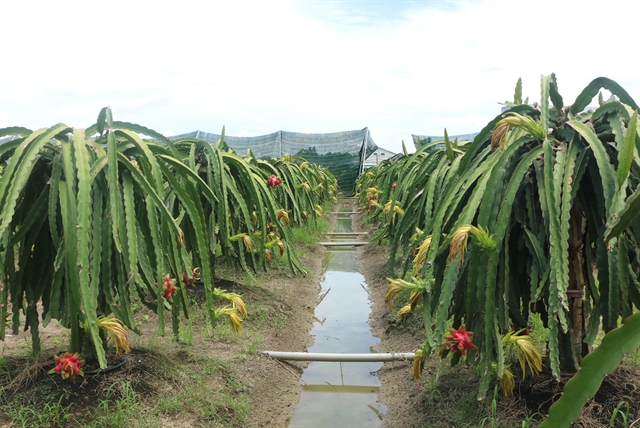 Society
Society

The Cửu Long (Mekong) Delta province of Long An will expand cultivation of organic dragon fruit, primarily in Châu Thành District, according to its Department of Agriculture and Rural Development.

|
| An organic dragon fruit orchard in Long An Province’s Châu Thành District. — VNA/VNS Photo Bùi Giang |
LONG AN –—The Cửu Long (Mekong) Delta province of Long An will expand cultivation of organic dragon fruit, primarily in Châu Thành District, according to its Department of Agriculture and Rural Development.
Nguyễn Chí Thiện, deputy director of the department, said the authorities in the district, department and companies had piloted an organic dragon fruit model in Thanh Phú Long, Phú Ngãi Trị and Dương Xuân Hội communes that turned out to be highly efficient.
Nguyễn Ngọc Tài, who cultivates 520 organic dragon fruit in Dương Xuân Hội Commune, said the model does not use chemicals and pesticides, and produces a high yield.
Organic dragon fruit plants are guaranteed outlets and sell for prices 10 per cent higher than the market price, he said.
Châu Thành, which has the largest dragon fruit growing area in Long An, has more than 9,000ha of dragon fruit.
Nguyễn Quốc Trịnh, chairman of the Long An Dragon Fruit Association, said that localities should encourage farmers to expand the pilot models, which will help increase both yield and quality, and open up possibilities for exporting to demanding markets.
Long An, the country’s second-largest dragon fruit producer, after only the south-central province of Bình Thuận, has nearly 12,000ha of dragon fruit, including nearly 2,100ha planted with efficient irrigation facilities and other advanced techniques.
Efficient irrigation helps farmers save 50 - 80 per cent on irrigation water compared to manual irrigation and 10 – 40 per cent on fertiliser, reducing production costs by VNĐ2 – 4 million (US$86 - $172) per hectare a month, according to the department.
Among other co-operatives that have received assistance, the Thanh Phú Long Agriculture Co-operative in Châu Thành’s Thanh Phú Long Commune last year received instruction in growing techniques under Vietnamese Good Agricultural Practices (VietGAP) from the Việt Nam Co-operative Alliance. The alliance also helped them build a brand name for their dragon fruit and informed them of the importance of origin traceability.
After this, the co-operative signed contracts to supply dragon fruit to various supermarkets in HCM City.
Dragon fruit is one of Việt Nam’s nine key crops that have competitive advantages in the world market. However, most dragon fruit farmers in the country have unstable incomes because they have not have secured outlets.
Dragon fruit is cultivated in 30 cities and provinces nationwide, with Bình Thuận, Long An and Tiền Giang provinces, accounting for 93 per cent of the country’s total dragon fruit growing areas.
Bình Thuận has 29,000ha of dragon fruit and Tiền Giang has 8,000ha. — VNS




